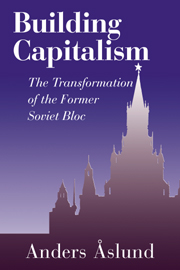Book contents
- Frontmatter
- Contents
- List of Tables and Charts
- Acknowledgments
- List of Abbreviations
- Introduction
- 1 What Communism Actually Was
- 2 The Decline and Fall of Socialism
- 3 Strategic Policy Choices
- 4 Changes in Output and Their Causes
- 5 Liberalization
- 6 Financial Stabilization
- 7 Privatization
- 8 Social Developments and Policy
- 9 State and Politics in the Transformation
- 10 Role of the Outside World
- 11 Conclusions
- Bibliography
- Index
10 - Role of the Outside World
Published online by Cambridge University Press: 15 September 2009
- Frontmatter
- Contents
- List of Tables and Charts
- Acknowledgments
- List of Abbreviations
- Introduction
- 1 What Communism Actually Was
- 2 The Decline and Fall of Socialism
- 3 Strategic Policy Choices
- 4 Changes in Output and Their Causes
- 5 Liberalization
- 6 Financial Stabilization
- 7 Privatization
- 8 Social Developments and Policy
- 9 State and Politics in the Transformation
- 10 Role of the Outside World
- 11 Conclusions
- Bibliography
- Index
Summary
The collapse of communism and the Soviet Bloc dominated all discussions about society in the world in 1989. That year was immediately seen as one of the great revolutionary years in history, most often compared with the great liberal revolutions of 1848 (Ash 1990; Dahrendorf 1990). The importance of these events was beyond dispute, and public attention was unprecedented. All kinds of social scientists were suddenly preoccupied with postcommunist transition to democracy and a market economy.
A plethora of issues was raised in the international debate. What kind of societies would these postcommunist countries become? How close to the West would they come? What kind of assistance did they need? What could and should the West do for them? What organizations or forms of cooperation should be used? How much money was needed and was the West prepared to put it up?
Any kind of international assistance involved many judgments. It required that the donors be reasonably convinced that they understood what was going on and that their assistance would have positive effects. An obvious precondition for any support would be a positive judgment of the rulers in a potential recipient country, another that their political strength sufficed.
In this chapter, we shall first look into the Western interests at the time. Overwhelmingly, the West perceived great interests in Central Europe, but little or no interest in Russia and the rest of the CIS. Next we shall examine cases of successful cooperation, followed by a discussion of the less successful cases. A matter of much misperception is the volume of international financial flows and Western assistance, which we shall put into perspective.
- Type
- Chapter
- Information
- Building CapitalismThe Transformation of the Former Soviet Bloc, pp. 396 - 440Publisher: Cambridge University PressPrint publication year: 2001



